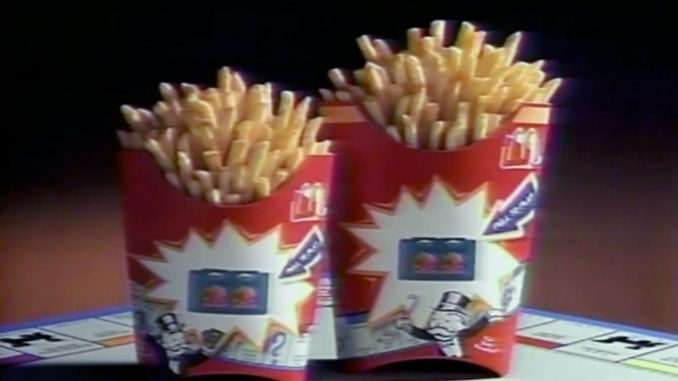
On Feb. 3, “McMillion$,” a six-part documentary-series, aired on HBO. It’s executively produced by Mark Wahlberg and written and directed by James Lee Hernandez and Brian Lazarte.
“McMillion$” chronicles the ‘90s McDonald’s Monopoly game fraud; and as the FBI agents featured in the series say, the case is fun.
In the ‘90s, McDonald’s ran a Monopoly game in order to increase sales. This game featured shiny plastic pieces attached to McDonald’s food and drink containers or in magazine advertisements.
Putting these plastic pieces together, similar to how players in Monopoly collect property, could have tremendous prizes. Just one piece could win customers anywhere from a drink to $1 million.
These pieces were distributed randomly throughout factory batches. But, McDonald’s never suspected that someone was stealing the pieces.
“McMillion$”’s narrative starts in 2001, when the FBI is tipped-off about a possible McDonald’s Monopoly scheme.
The series mostly follows the FBI in Miami from the moment agent Doug Matthews picked the case up, literally.
The series is bedazzled with Matthews’ condescending humor especially in describing typical FBI work.
Nevertheless, one can find themself attempting to figure out the case along with agent Matthews.
The series uses B-roll footage of McDonald’s stores and police technology in the ‘90s, creating nostalgia for viewers who are too young to even remember the ‘90s. Its aesthetics are reminiscent of crime series such as “The Wire.”
The stylized pulp-fiction-esque sequences of the FBI agents generates excitement in duller moments in the series about Monopoly.
The Monopoly board game, originally called the Landlord game, was invented in 1903 by Elizabeth Magie who wanted to use the game as a platform to discuss greed associated with land and wealth.
Unlike in the well-known Monopoly game, where the wealthiest player wins, the Landlord game also included an anti-monopolist version of the game, where wealth was distributed to all players.
In 1935, unemployed Charles Darrow copied and sold the game to Parker Brothers. In the first year, 278,000 copies were sold.
According to the Guardian, Magie only received $500 dollars from Parker Brothers and died without recognition for her all-American board game.
Ironically, the rights to this board game originally against wealth and property accumulation was completely monopolized by Darrow, who received royalties from the sale of hundreds of millions of copies of Monopoly.
The McDonald’s Monopoly scheme reflected Darrow’s greed; “Uncle Jerry” or Jerry Jacobson, the man behind the scheme, wanted all of the winning pieces.
The most interesting aspect of the series is how the pieces were stolen and distributed: Jacobson would steal winning pieces from Simon Marketing, which produced game pieces for McDonald’s, from the inside as a security guard.
Jacobson would give the game pieces to distributors in small plastic vials or sandwich bags, for a cut of the profit. These distributors would then sell these pieces to other people they knew for a hefty price.
When the “winners” cashed in their winning piece, Jacobson required them to make fake addresses and phone numbers to send the checks to.
While many of the prize “winners” were those who could afford to purchase game pieces at a high price, others were not as wealthy.
Gloria Brown, who “won” the $1 million piece, is a single mother and full-time social worker from Jacksonville, FL. When offered the $1 million piece, she took the offer to support her son because her salary of $23,000 a year was not enough.
Little did she know, she would have to come up with $40,000 in order to receive the ticket from a distributor, Gerano “Jerry” Colombo. To do this, she mortgaged her house.
Brown’s story shows how greed can corrupt good, hard-working Americans into making unfavorable choices for the benefit of their family.
It also portrays Magie’s anti-capitalist message, showing the audience how greed in society deprives workers of adequate pay and social services like health care and education.
The “jail” in Magie’s game was also supposed to entertain players as they awaited to roll doubles to get back in the game. In “McMillion$,” this excited attitude is reflected in the FBI’s hunt for Uncle Jerry.
The series is not especially creative or profound. No new ideas about society are discussed and the B-roll can get old at times.
The message of the series appears to congratulate the FBI at times, despite how it exposes even unfavorable parts of the agents’ personalities, especially Matthews’.
This series is a break from all those disturbing true-crime documentaries like “Don’t F*ck with Cats” (just to name one), which seems to profit off of the misfortune of others.
“McMillion$” stood out to me in the way that it documents the methods the FBI used when solving the case. The plethora of footage and interviews with “winners”, McDonald’s employees and even those in the mob made it feel believable.
“McMillion$” did not seem to be exploiting the tragedy of others and gave sympathy to even the Italian mob.
The purpose of this series is not to educate audiences on any social justice issue. But to instead serve as entertainment that is suitable to watch with family and friends in a casual setting.
On March 10, the last episode of the six-part series aires on HBO. It is presented by Unrealistic Ideas production and Fun Meter. It is also produced by Archie Gips, James Lee Hernandez and Brian Lazarte.
